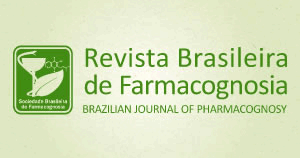Abstract
The aqueous extract (AE) and isolated fraction (ppt-3) of Cuphea carthagenensis (Jacq.) J. F. Macbr (sete-sangrias) were tested using models of nociception and inflammation in mice. Oral administration (p.o.) of the AE (10 to 100 mg/kg) and fraction ppt-3 (0.1 to 10 mg/kg) reduced the acetic acid-induced writhing in mice by 40 to 50% and by 46 to 70% of control, respectively. At the same doses AE and ppt-3 did not affect the tail flick response. Fraction ppt-3 also reduced the carrageenininduced paw edema, but at a dose 1000 times higher than that inducing antinociception. The results indicated the presence in the plant of antinociceptive constituents devoid of antiinflammatory activity, with actions apparently mediated by non-opioid mechanisms.
Antinociceptive and antiinflammatory activities of the aqueous extract and isolated Cuphea carthagenensis (Jacq.) J. F. Macbr.
Francis Rigolo FernandesI; André Luis dos SantosI; Ana Maria Soares de ArrudaII; Luciana de Miranda C. Vasques-PintoI; Rosely Oliveira GodinhoI; Luce Maria Brandão TorresI; Antonio José LapaI; Caden SouccarI, * * csouccar.farm@infar.epm.br
IDepartment of Pharmacology, Natural Products Section, Universidade Federal de São Paulo, Escola Paulista de Medicina, Rua Três de Maio 100, 04044-020, São Paulo, SP
IIDepartment of Pharmacology, Universidade Federal do Paraná, Curitiba, PR, Brazil
ABSTRACT
The aqueous extract (AE) and isolated fraction (ppt-3) of Cuphea carthagenensis (Jacq.) J. F. Macbr (sete-sangrias) were tested using models of nociception and inflammation in mice. Oral administration (p.o.) of the AE (10 to 100 mg/kg) and fraction ppt-3 (0.1 to 10 mg/kg) reduced the acetic acid-induced writhing in mice by 40 to 50% and by 46 to 70% of control, respectively. At the same doses AE and ppt-3 did not affect the tail flick response. Fraction ppt-3 also reduced the carrageenininduced paw edema, but at a dose 1000 times higher than that inducing antinociception. The results indicated the presence in the plant of antinociceptive constituents devoid of antiinflammatory activity, with actions apparently mediated by non-opioid mechanisms.
Full text available only in PDF format.
Texto completo disponível apenas em PDF.
Acknowledgments
This work was supported by grants from Central de Medicamentos (CEME - MS) and Conselho Nacional de Desenvolvimento Científico e Tecnológico (CNPq). FRF was a recipient of a fellowship from CNPq (IC); ALS and LMCVP received a MS fellowship from CAPES.
- 1 Hoehne FC - Plantas e Substâncias Vegetais Tóxicas e Medicinais. Editora Departamento de Botânica do Estado. Pg. 206-209, Săo Paulo, 1939
- 2 Correa MP. Dicionário das Plantas Úteis do Brasil e das Exóticas Cultivadas. Ministério da Agricultura. Instituto Brasileiro de Desenvolvimento Florestal. Rio de Janeiro - RJ. vol. V, p. 411, 1984
- 3 Santos SN, Souccar C, Lapa AJ. Atividade farmacológica de Cuphea aperta Koehe (sete-sangrias)/ XI Simp. De Plantas Medicinais do Brasil, Rio de Janeiro, RJ, 1986, p. 30
- 4 Ericeira VR, Martins MMR, Souccar C, Lapa AJ. Atividade farmacológica do extrato etanólico da "sete-sangrias", a Cuphea balsamona Scham. e Schltd. VIII Simp. de Plantas Medicinais do Brasil. Pág. 35, res. 39, Manaus, AM, 1984
- 5 Viel TA, Torres LMB, Lima-Landman MTR, Godinho RO, Lapa AJ, Souccar C. Efeitos do extrato aquoso (EA) e das fraçőes semi-purificadas de Cuphea carthagenensis (Jacq.) J.F. MacBr. (sete-sangrias) em sinapses colinérgicas periféricas. XIII Reuniăo Anual da Federaçăo de Sociedades de Biologia Experimental, Caxambú-MG, 1998, pág. 190 Res. 12.081
- 6 Ferreira SH, Nakamura M, Castro MSA. The hyperalgesic effects of prostacyclin and prostaglandin E. Prostaglandins 1978; 16:31-37
- 7 Berkenkopf JW, Weichman BM. Production of prostacyclin in mice following intraperitoneal injection of acetic acid, phenylbenzoquinone and zymosan: Its role in the writhing response. Prostaglandins 1988; 36: 693-709
- 8 Emim JAS, Souccar C, de A Castro MS, Godinho RO, Cezari MH, Juliano L, Lapa AJ. Evidence for activation of the tissue kallikrein-kinin system in nociceptive transmission and inflammatory responses of mice using a specific enzyme inhibitor. Br J Pharmacol 2000; 130:1099-107
Publication Dates
-
Publication in this collection
05 Oct 2009 -
Date of issue
2002

